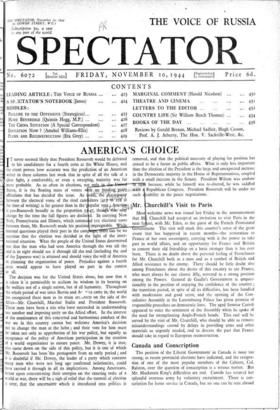AMERICA'S CHOICE
IT never seemed likely that President Roosevelt would be defeated in his candidature for a fourth term at the White House, and the event proves how accurate was the prediction of an American writer in these columns last week that in spite of all the talk of a close fight, a comfortable, or even a sweeping, majority was far more probable. As so often in elections, notlgy_ira.....timo-1;friteri—trT1393 States, it is the floating mass of voters th 1.51 in161,0mIty,t affiliations that has decided the issue. As sail, the 1r14e,,Y between the electoral votes of the rival can dates (41 41 Yg'it the time of writing) is far greater than in the' Is pro-Roosevelt broadly in the proportion 5 change by the time the full figures are declar d. In carrying New
pular \REF 4rAerierA 47, thoiefi Lthlat totar York, Pennsylvania and Illinois, which comma d electoral votes between them, Mr. Roosevelt made his positio impregnable. W
internal questions played their part in the cam can be no question that the election was decided in the light of the inter- national situation. What the people of the United States determined was that the man who had seen America through the war till the end is in sight should sec it through till the end (including the end of the Japanese war) is attained and should voice the will of America in planning the organisation of peace. Prejudice against a fourth term would appear to have played no part in the contest at all.
The decision was for the United Statei alone, but now that it is taken it is permissible to acclaim its wisdom in its bearing on the welfare not of a single nation, but of all humanity. Throughout the whole period of war since Russia and Ar --'ca came in, the world has recognised three men as its main arc.aatects on the side of the Allies—Mr. Churchill, Marshal Stalin and President Roosevelt. These men have been a trio who have succeeded in understanding one another and imposing unity on the Allied effort. In the interest of the continuance of this concerted and harmonious conduct of the war we in this country cnnot but welcome America's decision not to change the man at the helm ; and their vote for him must be taken not only as approbation of his war policy, but equally as acceptance of the policy of American participation in the creation of a world organisation to ensure peace. Mr. Dewey, it is true, also came down on the side of this policy, but it is one of which Mr. Roosevelt has been 'the protagonist from an early period ; and It is doubtful if Mr. Dewey, the leader of a party which contains many men who were not long ago confirmed isolationists, could have carried it through in all its implications. Among Americans, intent upon concentrating their energies on the exacting tasks of a world at war, there will be a sigh of relief that the turmoil of election is over, that the uncertainty which it introduced into politics is
removed, and that the political necessity of playing for position has ceased to be a factor in public affairs. What is only less important than the election of the President is the large and unexpected increase in the Democratic majority in the House of Representatives, coupled with a small increase in the Senate. President Wilson was undone because, while he himself was re-elected, he was saddled Republican Congress. President Roosevelt will be under no such t "sability in the peace negotiations.


























